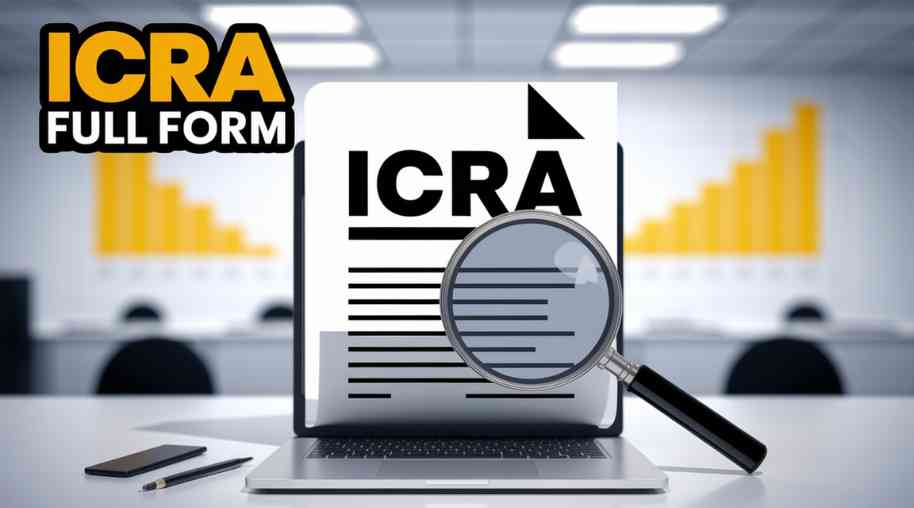ICRA Full Form-Investment Information and Credit Rating Agency
by Shashi Gaherwar
0 2346
Investment Information and Credit Rating Agency: Role, Importance, and Impact
Introduction
Investment Information and Credit Rating Agencies (CRA) play a vital role in financial markets by assessing the creditworthiness of companies, governments, and financial instruments. Their evaluations help investors make informed decisions while also influencing the cost of borrowing for issuers.

This article explores the functions, significance, methodology, impact, challenges, and future prospects of credit rating agencies.
What is an Investment Information and Credit Rating Agency?
A Credit Rating Agency (CRA) is an independent financial institution that assesses and assigns credit ratings to entities and financial products. These agencies evaluate the risk associated with debt instruments like bonds, corporate loans, and sovereign debt to help investors gauge the likelihood of repayment.
The major international credit rating agencies include:
- Standard & Poor’s (S&P)
- Moody’s Investors Service
- Fitch Ratings
In India, the leading credit rating agencies include:
- Credit Rating Information Services of India Limited (CRISIL)
- ICRA Limited
- CARE Ratings
- Brickwork Ratings
Functions of Credit Rating Agencies
- Assessing Creditworthiness – Analyzing the financial strength and repayment capability of borrowers.
- Assigning Ratings – Providing ratings based on a detailed assessment of financial instruments.
- Reducing Investment Risk – Helping investors identify safer investment options.
- Enhancing Market Transparency – Providing unbiased financial information to the public.
- Facilitating Capital Market Growth – Encouraging investor confidence by offering reliable risk assessments.
How Credit Ratings Work
Credit ratings are categorized into investment grade and non-investment grade (junk bonds) based on risk levels:
- Investment Grade: Low-risk investments (AAA, AA, A, BBB)
- Speculative Grade (Junk Bonds): High-risk investments (BB, B, CCC, D)
A higher rating indicates lower risk and better creditworthiness, while a lower rating signals higher default probability.
Importance of Credit Rating Agencies
- Guides Investor Decisions – Investors rely on ratings to assess financial instruments.
- Affects Borrowing Costs – Higher-rated entities get loans at lower interest rates.
- Encourages Economic Stability – By preventing risky investments, CRAs help maintain financial stability.
- Boosts Foreign Investment – International investors use ratings to evaluate investment opportunities.
- Supports Corporate Growth – Companies with good ratings can access funds more easily.
Challenges Faced by Credit Rating Agencies
- Conflicts of Interest – Rating agencies are often paid by the issuers they evaluate.
- Accuracy of Ratings – Failures in predicting financial crises raise concerns about rating credibility.
- Regulatory Issues – Governments impose strict regulations to ensure transparency.
- Market Influence – Ratings can sometimes trigger panic selling and market instability.
- Over-Reliance on Ratings – Investors may rely too much on ratings without conducting personal research.
Future of Credit Rating Agencies
- Technology Integration: AI and big data will enhance credit analysis and rating accuracy.
- Stricter Regulations: Governments may enforce stricter guidelines to maintain objectivity.
- Emerging Market Growth: More local#39;s may emerge to cater to specific markets.
- Sustainability Ratings: Environmental, Social, and Governance (ESG) ratings will gain importance in investment decisions.
Investment Information and Credit Rating Agencies play a crucial role in financial markets by helping investors make informed decisions, reducing risks, and influencing economic stability. While they face challenges like conflicts of interest and regulatory scrutiny, their role in global financial markets remains indispensable. With the integration of technology and improved regulations, CRAs will continue to shape investment landscapes and promote financial transparency.
Understanding credit ratings can help investors, businesses, and policymakers navigate complex financial markets and make well-informed financial decisions.
Further Learning Resources
If you’re passionate about building a successful blogging website, check out this helpful guide at Coding Tag – How to Start a Successful Blog. It offers practical steps and expert tips to kickstart your blogging journey!
For dedicated UPSC exam preparation, we highly recommend visiting www.iasmania.com. It offers well-structured resources, current affairs, and subject-wise notes tailored specifically for aspirants. Start your journey today!

Share:









Comments
Waiting for your comments